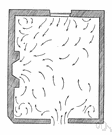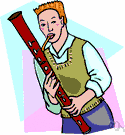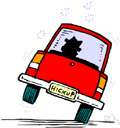wind
wind 1
(wĭnd)wind 2
(wīnd)wind 3
(wīnd, wĭnd)wind
(wɪnd)wind
(waɪnd)wind
(waɪnd)wind1
(n. wɪnd, Literary waɪnd; v. wɪnd)n.
wind2
(waɪnd)v. wound (waʊnd) or (Rare) wind•ed (ˌwaɪn dɪd) wind•ing; v.i.
wind3
(waɪnd, wɪnd)v.t. wind•ed or wound (waʊnd) wind•ing.
WInd or W.Ind.,
wind
(wĭnd)Wind
2. a sultry southeast wind in the same regions.
3. a hot, oppressive wind of cyclonic origin, as in Kansas.
Wind
wind instruments in an orchestra; their players collectively, 1876.Wind
See Also: WEATHER
- Breeze [after a very hot day] … as torrid as the air from an oven —Ellen Glasgow
- The breeze flowed down on me, passing like a light hand —Louise Erdrich
- The breeze … sent little waves curling like lazy whips along the shingle [of a house] —John Fowles
- A breeze which came like a breath —Paul Horgan
- A draft … struck through his drenched clothes like ice cold needles —Cornell Woolrich
- A gathering wind sent the willows tossing like a jungle of buggy whips —William Styron
- High wind … like invisible icicles —Rebecca West
- Level winds as flat as ribbons —M. J. Farrell
- A northeaster roared down on us like a herd of drunken whales —T. Coraghessan Boyle
- A northeast wind which cut like a thousand razors —Frank Swinnerton
See Also: PAIN
- A sandy wind blowing rough as an elephant —Truman Capote
- The sound of wind is like a flame —Yvor Winters
- The sunless evening wind slid down the mountain like an invisible river —Dorothy Canfield Fisher
- The night wind rushed like a thief along the streets —Brian Moore
- There came a wind like a bugle —Emily Dickinson
This is both title and first line of a poem.
- The warm spring wind fluttered against his face like an old kiss —Michael Malone
- Wind … beat like a fist against his face —Vicki Baum
- The wind blew gusts of wind into his face that were much like a shower-bath —Honore de Balzac
- The wind blew him like a sail up against a lifeboat —F. Scott Fitzgerald
- Wind … blowing down from a flat black sky like painted cardboard —Marge Piercy
- Wind … driving the dry snow along with it like a mist of powdered diamonds —Henry Van Dyke
- The wind drove against him like a granite cliff —Edith Wharton
- Wind … dry and faint, like the breath of some old woman —Joe Coomer
- Wind … dry and fresh as ice —Frank Ross
- The wind filled his shirt like a white sail —Yitzhak Shenhar
- The wind flicked about a little like the tail of a horse that’s trying to decide what sort of mood it’s in tonight —Douglas Adams
- The wind howls like a chained beast in pain —Delmore Schwartz
- The wind howls like air inside a shell —Tracy Daugherty
- The wind is like a dog that runs away —Wallace Stevens
- The wind is like a hand on my forehead, in caress —John Hall Wheelock
- Wind like a hungry coyote’s cry —Patricia Henley
- Wind like a perfumed woman in heat —Clive Irving
- The wind like a razor —Miles Gibson
- The wind like a saw-edged knife —Paul J. Wellman
- The wind [in autumn] moves like a cripple among the leaves —Wallace Stevens
- The wind plunged like a hawk from the swollen clouds —Ellen Glasgow
- (The gray winter) wind prowling like a hungry wolf just beyond the windows —George Garrett
- The wind ran in the street like a thin dog —Katherine Mansfield
- Wind ringing in their ears like well-known old songs —Hans Christian Andersen
- The wind rose out of the depth below them, sounding as if it were pushing boulders uphill —Martin Cruz Smith
- Wind … rustling the … child’s hair like grass —Marguerite Duras
- The wind screamed like a huge, injured thing —Scott Spencer
- Wind … surges into your ear like breath coming and going —Philip Levine
- The wind swept the snow aside, ever faster and thicker, as if it were trying to catch up with something —Boris Pasternak
- The wind whistled … like a pack of coyotes —Paige Mitchell
- A wind will … knock like a rifle-butt against the door —Wallace Stevens
The comparison appears in Stevens’ poem, The Auroras of Autumn. The full line from which the rifle-butt comparison is taken includes “A wind will spread its windy grandeurs round and …”
wind
Wind can be a noun or a verb.
The wind /wɪnd/ is a current of air moving across the earth's surface.
The verb wind /waɪnd/ has a completely different meaning. If a road or river winds in a particular direction, it goes in that direction with a lot of bends.
The past tense and -ed participle of this verb is wound, pronounced /waʊnd/.
You can also wind /waɪnd/ something around something else. For example, you can wind a wire around a stick. This means that you wrap the wire around the stick several times.
When you wind /waɪnd/ something such as a watch or a clock, you turn a knob or handle several times in order to make it operate.
Wound can also be pronounced /wuːnd/. When it is pronounced like this, it is a noun or a verb, and it has a completely different meaning. A wound is damage to a part of your body, caused by a weapon.
If someone wounds you, they damage your body using a weapon.
wind
(current of air)Past participle: winded
Gerund: winding
| Imperative |
|---|
| wind |
| wind |
wind
(coil or twist)Past participle: wound
Gerund: winding
| Imperative |
|---|
| wind |
| wind |
wind
(blow bugle etc.)Past participle: winded/wound
Gerund: winding
| Imperative |
|---|
| wind |
| wind |
| Noun | 1. |  wind - air moving (sometimes with considerable force) from an area of high pressure to an area of low pressure; "trees bent under the fierce winds"; "when there is no wind, row"; "the radioactivity was being swept upwards by the air current and out into the atmosphere" wind - air moving (sometimes with considerable force) from an area of high pressure to an area of low pressure; "trees bent under the fierce winds"; "when there is no wind, row"; "the radioactivity was being swept upwards by the air current and out into the atmosphere"airstream - a relatively well-defined prevailing wind breeze, gentle wind, zephyr, air - a slight wind (usually refreshing); "the breeze was cooled by the lake"; "as he waited he could feel the air on his neck" harmattan - a dusty wind from the Sahara that blows toward the western coast of Africa during the winter crosswind - wind blowing across the path of a ship or aircraft khamsin - an oppressively hot southerly wind from the Sahara that blows across Egypt in the spring Santa Ana - a strong hot dry wind that blows in winter from the deserts of southern California toward the Pacific Coast high wind - a very strong wind; "rain and high winds covered the region" headwind - wind blowing opposite to the path of a ship or aircraft catabatic wind, katabatic wind - a wind caused by the downward motion of cold air tailwind - wind blowing in the same direction as the path of a ship or aircraft doldrums - a belt of calms and light winds between the northern and southern trade winds of the Atlantic and Pacific northwest wind, northwester - a wind from the northwest southwester, sou'wester - a strong wind from the southwest sou'easter, southeaster - a strong wind from the southeast gale - a strong wind moving 45-90 knots; force 7 to 10 on Beaufort scale monsoon - a seasonal wind in southern Asia; blows from the southwest (bringing rain) in summer and from the northeast in winter monsoon - any wind that changes direction with the seasons prevailing wind - the predominant wind direction; "the prevailing wind is from the southwest" squall - sudden violent winds; often accompanied by precipitation thermal - rising current of warm air atmospheric condition, weather, weather condition, conditions - the atmospheric conditions that comprise the state of the atmosphere in terms of temperature and wind and clouds and precipitation; "they were hoping for good weather"; "every day we have weather conditions and yesterday was no exception"; "the conditions were too rainy for playing in the snow" air - a mixture of gases (especially oxygen) required for breathing; the stuff that the wind consists of; "air pollution"; "a smell of chemicals in the air"; "open a window and let in some air"; "I need some fresh air" |
| 2. | wind - a tendency or force that influences events; "the winds of change" influence - the effect of one thing (or person) on another; "the influence of mechanical action" | |
| 3. | wind - breath; "the collision knocked the wind out of him" | |
| 4. | wind - empty rhetoric or insincere or exaggerated talk; "that's a lot of wind"; "don't give me any of that jazz" | |
| 5. | wind - an indication of potential opportunity; "he got a tip on the stock market"; "a good lead for a job" counseling, counselling, guidance, counsel, direction - something that provides direction or advice as to a decision or course of action | |
| 6. |  wind - a musical instrument in which the sound is produced by an enclosed column of air that is moved by the breath wind - a musical instrument in which the sound is produced by an enclosed column of air that is moved by the breathbell - the flared opening of a tubular device brass instrument, brass - a wind instrument that consists of a brass tube (usually of variable length) that is blown by means of a cup-shaped or funnel-shaped mouthpiece free-reed instrument - a wind instrument with a free reed kazoo - a toy wind instrument that has a membrane that makes a sound when you hum into the mouthpiece embouchure, mouthpiece - the aperture of a wind instrument into which the player blows directly musical instrument, instrument - any of various devices or contrivances that can be used to produce musical tones or sounds ocarina, sweet potato - egg-shaped terra cotta wind instrument with a mouthpiece and finger holes pipe organ, organ - wind instrument whose sound is produced by means of pipes arranged in sets supplied with air from a bellows and controlled from a large complex musical keyboard pipe - a tubular wind instrument post horn - wind instrument used by postilions of the 18th and 19th centuries whistle - a small wind instrument that produces a whistling sound by blowing into it | |
| 7. |  wind - a reflex that expels intestinal gas through the anus wind - a reflex that expels intestinal gas through the anusinborn reflex, innate reflex, instinctive reflex, physiological reaction, reflex, reflex action, reflex response, unconditioned reflex - an automatic instinctive unlearned reaction to a stimulus | |
| 8. |  wind - the act of winding or twisting; "he put the key in the old clock and gave it a good wind" wind - the act of winding or twisting; "he put the key in the old clock and gave it a good wind"rotary motion, rotation - the act of rotating as if on an axis; "the rotation of the dancer kept time with the music" | |
| Verb | 1. |  wind - to move or cause to move in a sinuous, spiral, or circular course; "the river winds through the hills"; "the path meanders through the vineyards"; "sometimes, the gout wanders through the entire body" wind - to move or cause to move in a sinuous, spiral, or circular course; "the river winds through the hills"; "the path meanders through the vineyards"; "sometimes, the gout wanders through the entire body"go, locomote, move, travel - change location; move, travel, or proceed, also metaphorically; "How fast does your new car go?"; "We travelled from Rome to Naples by bus"; "The policemen went from door to door looking for the suspect"; "The soldiers moved towards the city in an attempt to take it before night fell"; "news travelled fast" snake - move along a winding path; "The army snaked through the jungle" wander - go via an indirect route or at no set pace; "After dinner, we wandered into town" |
| 2. | wind - extend in curves and turns; "The road winds around the lake"; "the path twisted through the forest" be - have the quality of being; (copula, used with an adjective or a predicate noun); "John is rich"; "This is not a good answer" circumvolute - wind or turn in volutions, especially in an inward spiral, as of snail spiral - form a spiral; "The path spirals up the mountain" snake - form a snake-like pattern; "The river snakes through the valley" | |
| 3. | wind - arrange or or coil around; "roll your hair around your finger"; "Twine the thread around the spool"; "She wrapped her arms around the child" spool - wind onto a spool or a reel reel - wind onto or off a reel ball - form into a ball by winding or rolling; "ball wool" | |
| 4. |  wind - catch the scent of; get wind of; "The dog nosed out the drugs" wind - catch the scent of; get wind of; "The dog nosed out the drugs"smell - inhale the odor of; perceive by the olfactory sense | |
| 5. |  wind - coil the spring of (some mechanical device) by turning a stem; "wind your watch" wind - coil the spring of (some mechanical device) by turning a stem; "wind your watch" | |
| 6. | wind - form into a wreath | |
| 7. | wind - raise or haul up with or as if with mechanical help; "hoist the bicycle onto the roof of the car" |
wind
1"It's an ill wind that blows nobody any good"
Winds
| Wind | Location | |||
|---|---|---|---|---|
| berg wind | South Africa | |||
| bise | Switzerland | |||
| bora | Adriatic Sea | |||
| buran or bura | central Asia | |||
| Cape doctor | Cape Town, South Africa | |||
| chinook | Washington & Oregon coasts | |||
| föhn or foehn | N slopes of the Alps | |||
| harmattan | W African coast | |||
| khamsin, kamseen or kamsin | Egypt | |||
| levanter | W Mediterranean | |||
| libeccio or libecchio | Corsica | |||
| meltemi or etesian wind | NE Mediterranean | |||
| mistral | S France to Mediterranean | |||
| monsoon | S Asia | |||
| nor'wester | Southern Alps, New Zealand | |||
| pampero | S America | |||
| simoom or simoon | Arabia & N Africa | |||
| sirocco | N Africa to S Europe | |||
| tramontane or tramontana | W coast of Italy | Wind force | Beaufort number | Speed (kph) |
| Calm | 0 | less than 1 | ||
| Light air | 1 | 1-5 | ||
| Light breeze | 2 | 6-11 | ||
| Gentle breeze | 3 | 12-19 | ||
| Moderate breeze | 4 | 20-28 | ||
| Fresh | 5 | 29-38 | ||
| Strong | 6 | 39-49 | ||
| Near gale | 7 | 50-61 | ||
| Gale | 8 | 62-74 | ||
| Strong gale | 9 | 75-88 | ||
| Storm | 10 | 89-102 | ||
| Violent storm | 11 | 103-117 | ||
| Hurricane | 12 | 118 and over |
wind
2wind 1
nounverbwind 2
verbwind up
wind
1 [wɪnd]which way is the wind blowing? → ¿de dónde sopla el viento?
against the wind → contra el viento
to run before the wind (Naut) → navegar viento en popa
high wind → viento fuerte
into the wind → contra el viento
to see which way the wind blows → esperar para ver por dónde van los tiros
winds of change → aires mpl de cambio, aires mpl nuevos
to get wind of sth → enterarse de algo
to get the wind up → preocuparse
to have the wind up → estar preocupado
there's something in the wind → algo se está cociendo
to put the wind up sb (Brit) → dar un susto a algn
it really put the wind up me → me dio un susto de los buenos
to take the wind out of sb's sails → cortar las alas a algn
it's an ill wind that blows nobody any good → no hay mal que por bien no venga
see also sail A1
to break wind → ventosear
to bring up wind [baby] → eructar
to wind a baby → hacer eructar a un niño
to be winded by a ball → quedar sin aliento por el golpe de un balón
to be winded after a race → quedar sin aliento después de una carrera
wind cone N = windsock wind energy N = wind power wind farm N → parque m eólico
wind instrument N → instrumento m de viento
wind machine N → máquina f de viento
wind power N → energía f eólica or del viento
wind tunnel N → túnel m aerodinámico or de pruebas aerodinámicas
wind turbine N → aerogenerador m
wind
2 [waɪnd] (wound (pt, pp)) [waʊnd]the rope wound itself round a branch → la cuerda se enrolló en or alrededor de una rama
with a rope wound tightly round his waist → con una cuerda que le ceñía estrechamente la cintura
to wind wool into a ball → ovillar lana, hacer un ovillo de lana
wind this round your head → envuélvete la cabeza con esto, líate esto a la cabeza
to wind one's arms round sb → rodear a algn con los brazos, abrazar a algn estrechamente
the road winds up the valley → el camino serpentea por el valle
the car wound slowly up the hill → el coche subió lentamente la sinuosa colina
give the handle another wind → dale otra vuelta a la manivela
he wound up his speech by saying that → terminó su discurso diciendo que ...
wind
1 [ˈwɪnd]There was a strong wind → Il y avait beaucoup de vent.
The wind was blowing → Le vent soufflait.
a gust of wind → une rafale de vent
into the wind → contre le vent
She suffered from wind → Elle avait des vents.
to break wind → lâcher des vents
wind
2 [ˈwaɪnd] [wound] (pt, pp)to wind sth around sth [+ rope, bandage] → enrouler qch autour de qch
to wind up with sth → se retrouver avec qch
He wound up with no job and no girlfriend → Il s'est retrouvé sans travail et sans petite amie.
to wind up in jail → se retrouver en prison
wind
:wind
:wind
:wind
1wind
2 vb: pret, ptp <wound>wind
1 [wɪnd]high wind → vento forte
the wind is in the west → il vento viene da ponente
into or against the wind → controvento
to go like the wind → filare come il vento
to run before the wind (Naut) → andare con il vento in poppa
there's something in the wind (fig) → c'è qualcosa nell'aria
to get wind of sth → venire a sapere qc
to get or have the wind up (fam) → agitarsi
to take the wind out of sb's sails → smontare qn, spegnere l'entusiasmo di qn
to sail close to the wind (fig) → spingere le cose troppo in là (act almost illegally) → rasentare l'illegalità (risk causing offence) → rischiare di offendere
to throw caution to the winds → gettare la prudenza alle ortiche
to break wind → fare aria (fam) to bring up wind (baby) → fare il ruttino
to get one's wind back or one's second wind → riprendere fiato
to be short of wind → essere senza fiato
to wind a baby → far fare il ruttino a un bambino
wind
2 [waɪnd] (wound (pt, pp))to wind sb up (fig) (fam) (annoy) → far venire i nervi a or innervosire qn (kid, trick) → prendere in giro qn
we wound up in Rome → siamo finiti a Roma
